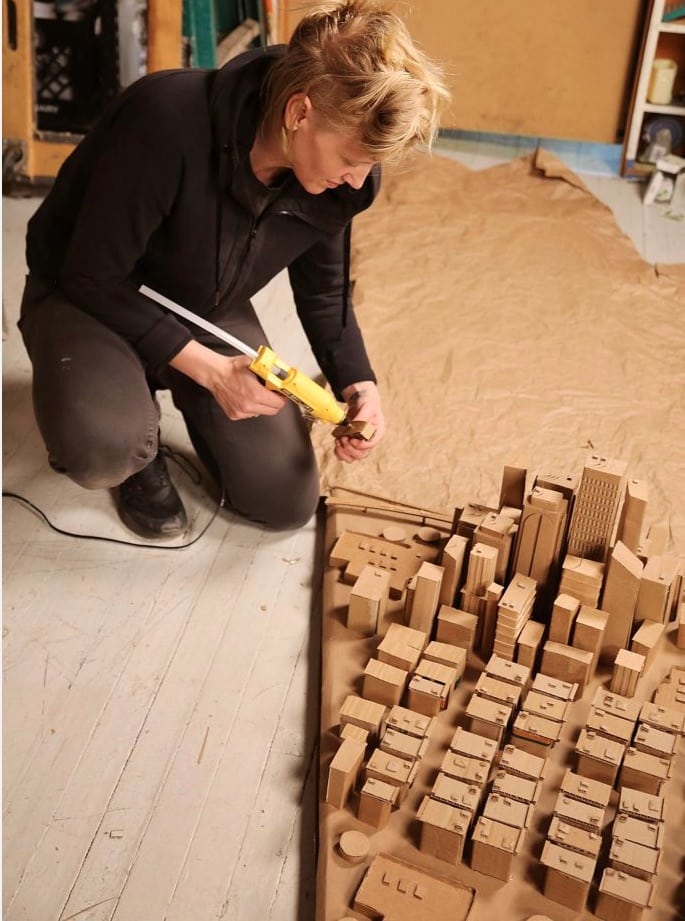Aspen (virtual) Shortsfest 2020: Inside the making of the mind-blowing ‘Bag’
The Aspen Times

Courtesy photo
This is not how Robin Frohardt expected the past few weeks to go.
The Colorado-bred, New York-based artist, puppeteer and filmmaker was due to open a major years-in-the-works public art show in Times Square on March 18 and to toast the world premiere of her short film “Bag” here at Aspen Shortsfest this week.
Like most events in the U.S., the exhibition was canceled along with the film premiere at Aspen’s Wheeler Opera House.
But “Bag” is getting its audience and a digital world premiere. It is screening at the virtual 2020 Aspen Shortsfest through April 5.
“Bag” is in Program Three of the virtual 2020 Aspen Shortsfest, available for screening through 11:59 p.m. on April 5.
Digital access codes can be purchased at aspenshowtix.com and 970-920-5770.
Individual programs are $10 ($7.50 for Aspen Film members) each, or the full nine-program festival pass for $75.
Viewers will receive via email a unique link to each program purchased for a one-time viewing on the Festival Scope platform.
Full program and more info at aspenfilm.org.
*
2020 ASPEN SHORTSFEST COVERAGE
Read the Aspen Times story on Shortsfest going virtual HERE
Read our “Ones to Watch” Shortsfest feature HERE
Read our feature of Justine Lupe and Briana Pozner’s ‘South of Bix’ HERE
Read our story on Aspenite Marc Bennett’s ‘The Tattooed Torah’ HERE
Bag’s journey
This stunning eight-minute labor of love traces the lifespan of a plastic bag in a stop-motion creation where everything you see on the screen was made from cardboard and glue.
The titular single-use plastic bag goes from recycling bin to garbage truck, trash barge to dump, from seagull to sea, to melting glacier and eventually back to a city now submerged by rising oceans and into a barnacle-pocked underwater subway station.
While the message may be grim, the tactile form is a feast for the eyes with a dose of unexpected humor. Through her intricate cardboard handiwork and lo-fi effects, Frohardt creates some miracles. All of it is hand-made art and puppetry, without a second of animation or digital effects, from the garbage truck rolling down the street to the crashing waves, a bear’s claw reaching across the screen and a close-up of a whale’s eye opening and closing.
“The eyeball is as big as a human head,” Frohardt explained of the sculpture she made to get that shot, for which she also sculpted two eyelids and moved them from off-screen with string.
Everything that’s moving on the screen Frohardt is moving physically from off-screen. The uncanny underwater effect is from a physical camera lens.
Frohardt made “Bag” without a crew — making, shooting and editing it herself.
“Occasionally I would drag someone in when I needed an extra pair of hands,” she said.
“Bag” is Frohardt’s second cardboard stop-motion film, following 2013’s “Fitzcardboardaldo,” an all-cardboard homage to Werner Herzog’s epic “Fitzcarraldo.”
“The idea came from taking one of the hardest movies to make and making it all out of cardboard,” Frohardt explained. “I really enjoyed the process.”
The new film is part of a larger and ongoing project about the forever life of plastic bags.
There’s no dialogue in “Bag,” but the mind-blowing visuals are carried along by composer Freddie Price’s original score. It can at once communicate the passage of centuries and the tension of a moment, with a dose of the whimsy to accompany the sometimes playfully rough-hewn cardboard scenery.
“I can just hand him an idea and he just nails it every time,” Frohardt said of Price. “I feel really lucky to work with him.”
Frohardt — who spent her childhood just over Independence Pass in Leadville, later living in Canon City and attending high school in Colorado Springs — made “Bag” without a script or storyboard. Knowing she wanted to tell the long life story of a plastic bag, she moved sequentially, and over the course of more than two years, created each intricate scene beginning with the New York City trashcan. She’d shoot each scene, edit it, and then figure out where the bag would go next and add a bit.
“Sometimes it’ll take a couple weeks to build something for one shot,” she said. “I definitely don’t get any faster, I just get into the details more and more.”
In between, Frohardt was working on a much bigger project: “The Plastic Bag Store,” an immersive puppetry showing which everything — thousands of items from toiletries to sushi rolls — is made of single-use plastic bags. It had been scheduled to open in Times Square, as part of the Times Square Arts program, on March 18. The exhibition has been postponed indefinitely due to the public health restrictions on crowds due to the coronavirus pandemic.
She also has a narrative play about a person from the future discovering a plastic bag and wildly misinterpreting its significance to the people of the 21st century.
“In that work and this film, I want people to understand the context of some of the things that we use and the disposability of thing and how there is no ‘away,’” Frohardt daid. “The red plastic straw that you stirred your coffee with in 2003 is still somewhere right now, it doesn’t go anywhere.”
Narrative art, theater and film, Frohardt believes, have a unique ability to effectively make the case for more sustainable lifestyles.
“I want to find visually engaging ways to talk about these kinds of environmental issues that can feel overwhelming and depressing,” she explained. “An image of sea life choking on plastic bags can be really distressing — you want to look away and swipe past if it comes up in your feed. But If you come up with something visually rich and engaging, it might sink in more.”
Canceling the opening of her big Times Square exhibition was “heartbreaking,” Frohardt said. But she is proud to share “Bag” through the virtual Shortsfest. Frohardt is riding out the COVID-19 quarantine period in upstate New York with the tools of her trade.
“I brought my camera and a bunch of cardboard and hot glue,” she said. “So I think maybe I’ll start a new one.”

Support Local Journalism

Support Local Journalism
Readers around Glenwood Springs and Garfield County make the Post Independent’s work possible. Your financial contribution supports our efforts to deliver quality, locally relevant journalism.
Now more than ever, your support is critical to help us keep our community informed about the evolving coronavirus pandemic and the impact it is having locally. Every contribution, however large or small, will make a difference.
Each donation will be used exclusively for the development and creation of increased news coverage.






